August 22, 2023
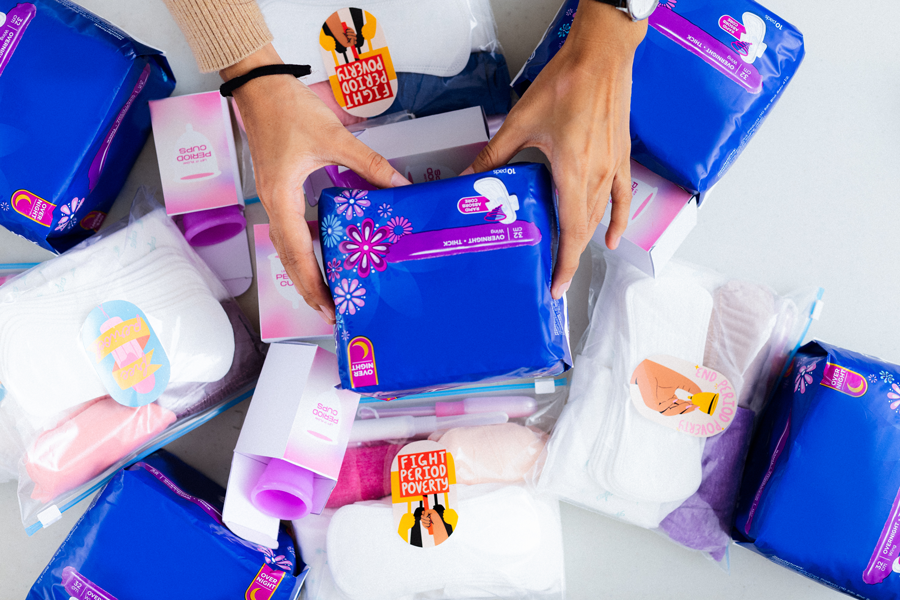
As Labour Day approaches, let’s talk about the impact menstruation has on people in the workplace — especially for employees without easy access to period products or washrooms on the job.
In Canada, menstruation is one of the top two reasons why people who menstruate miss work, impacting their livelihoods and their ability to provide for themselves, as well as their dignity and health. The inability to access period products is a contributing factor to this issue.
As a former letter carrier, Cori Longo remembers how deeply her period impacted her work. As she delivered mail in residential neighbourhoods with few to no public washrooms, she would often be caught off-guard by an unpredictable menstrual cycle — a common occurrence for many who menstruate — without products or washrooms to use them in.
“I remember one time, I had to go to a gas station far out of the way, during my workday. When I got there, the washroom out of order! I was like ‘what do I do?’ I explained to the woman behind the till how it was a desperate situation. She told me I could use it, but the light didn’t work, so here’s a flashlight. I needed that access to a sink and soap and washing hands, all of that,” Cori shares.
“Periods are hard to predict, and it so dependent on different things in your life, and each period is different. Sometimes you need different products. It’s not just the physiological side of things, there’s also the mental impact, and how it affects mood and behaviours and cramping. It impacts people really drastically — and it happens every four weeks, for a week. When you think about it, you spend three months of a year menstruating with all those symptoms.”
Now a Labour Cabinet member for United Way of the Alberta Capital Region and the regional representative for Alberta at the Canadian Labour Congress, Cori is a strong advocate for improving menstrual equity in the workplace, both through the labour movement and initiatives like United Way’s Period Promise.
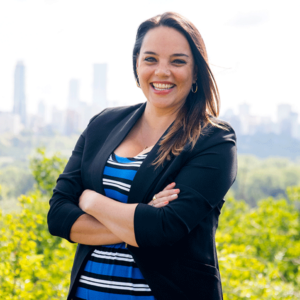 |
|
|---|
“If we expect employers and businesses to have washrooms and soap, towels, and toilet paper, we should also expect them to offer period products as well,” Cori says.
“When we consider the stats around how many people menstruate, and how often they menstruate, the symptoms and the impacts of those things — it’s a large percentage of your staff, your employees, your union’s membership.”
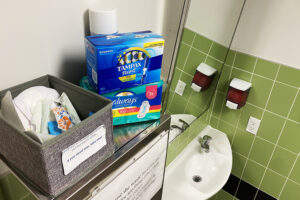
United Way of the Alberta Capital Region’s Period Promise is dedicated to providing access to free menstrual products as a step toward creating menstrual equity. Without access to period products, people who menstruate may have to call in sick, risk their health by using DIY period products, or try to work while being uncomfortable.
Since the launch of Period Promise’s workplace pledge last October, 10 workplaces in the Alberta Capital Region have signed on to provide free period products in all workplaces, including unions, small businesses, non-profits, and corporate offices. One of those workplaces is ISL Engineering, who signed onto the pledge in October 2022 and provide free products in 14 office locations.
“It is paramount for all leaders and organizations to do what we can to remove any barriers that exist and to support a diverse and equitable workplace,” explains Brad Campbell, manager of Edmonton office at ISL Engineering.
“It’s a small task that has a large impact. It’s low hanging fruit that has a huge impact on our workforce and our society as a whole. It’s pennies on the dollars for the investment on what you get back, and an easy way to remove one major barrier out there.”
United Way Period Promise pledge signatories aren’t the only ones making a difference by improving menstrual equity. Since 2021, several other organizations have announced free access to period products, including at select City of Edmonton facilities, Edmonton Public Schools, Edmonton Catholic Schools, and MacEwan University. The Government of Canada also recently announced changes to the Canada Labour Code to ensure access to menstrual products at federally regulated workplaces, starting December 15, 2023.
At this year’s Alberta Federation of Labour (AFL) convention in April, delegates from unions across the province gathered to review, prepare to debate, and vote on proposed resolutions. This year, one of the resolutions put forth was that Alberta unions and AFL work to end period poverty both in our workplaces and our communities.
The day before convention started, Dayna Bramston West, an activist and a delegate from United Food & Commercial Workers (UFCW) Local 401, was reviewing the resolution package and was inspired when she read the resolution about ending period poverty.
“I thought, why not start a collection drive at convention to put these words into action?” Dayna shares.
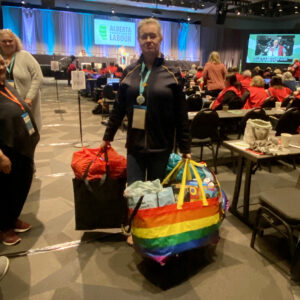
With encouragement from her local executive officers, she reached out to Charmaine St Germaine, a UFCW 401 worker representative and AFL Women’s Committee Co-Chair, who then reached out to Natasha Fryzuk, the Labour Community relationship lead for United Way of the Alberta Capital Region, to see if she could offer support for the initiative during convention.
“It was just one of those moments where everything fell into place: I already had a table set up, and had decided to bring some signage about the Period Promise pledge, so I was able to offer an easy, identifiable place for folks to drop off their donations,” Natasha describes.
Dayna explains what happened next:
“On the first day of convention I approached the microphone and asked for a point of personal privilege, did the big ask [for everyone to bring in period products throughout convention week], and got a big round of applause. To say that I was amazed by the how quickly and generously fellow labour activists donated would be an understatement. I did a tally and it came to approximately $1,400 in donations of products and cash, which I purchased even more [products] with.”
Since the convention was in Calgary, the decision was made to take the donations to Women’s Centre of Calgary.
“They were amazed by how many products they had received. The staff accepted them with great enthusiasm and were so grateful,” Dayna adds.
“For me, it was a magic moment to be there to support a labour initiative that aligns with the work we are doing here at United Way,” Natasha explains.
“Dayna and activists like her are the core, heart, and soul of the labour movement. Many times, I have been at a labour event and witnessed such acts of solidarity with the struggles of not just other workers but all humans.”
While all of these gains are important in the movement towards menstrual equity, there’s always more work to be done, especially within labour’s role to protect and strengthen worker rights, Cori explains.
“I think there’s also a place to talk about reusable products, period underwear, and other things that could help make having a period easier. And I think there’s a few different ways we can tackle this through the labour movement, by bargaining it into our contracts for one thing, and I think more unions should be taking this up as an issue.”
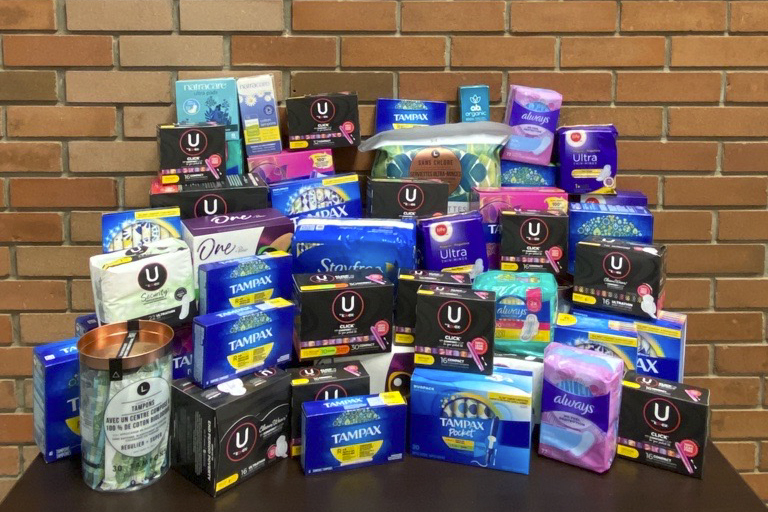
By making a Period Promise, you can make a real difference in your workplace, and move the needle on menstrual equity for everyone.
Learn More About Period Promise for Organizations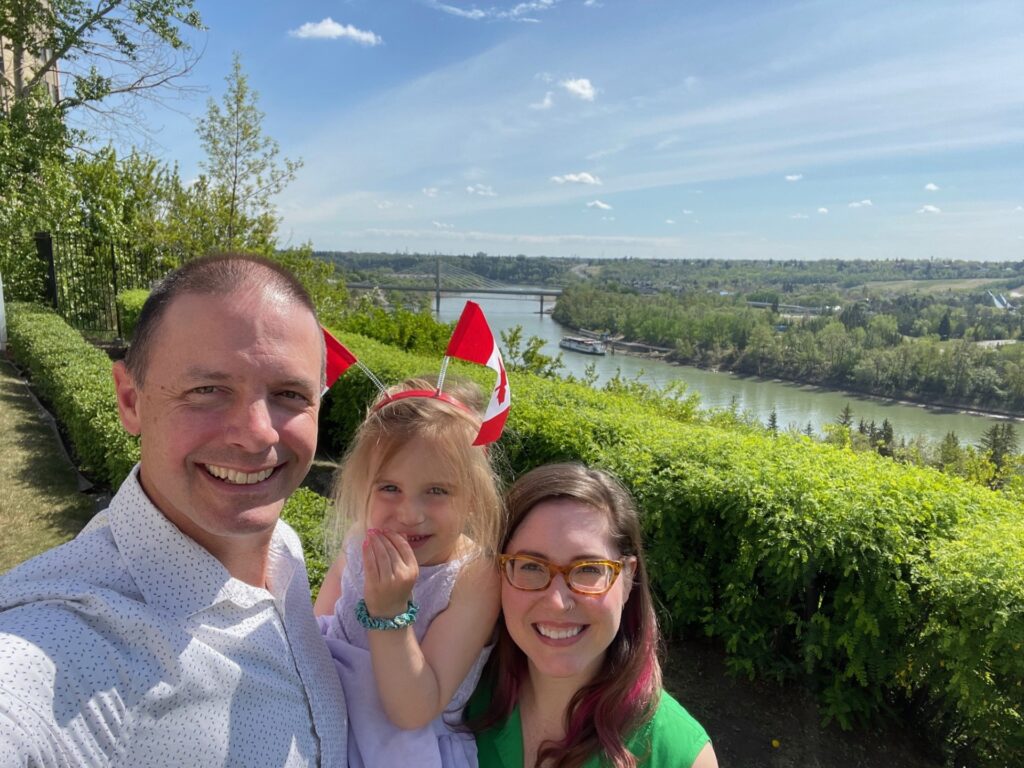
Jason Schauenberg, a proud ally and supporter of Women United, is helping pave the way for a more equitable future for his daughters.
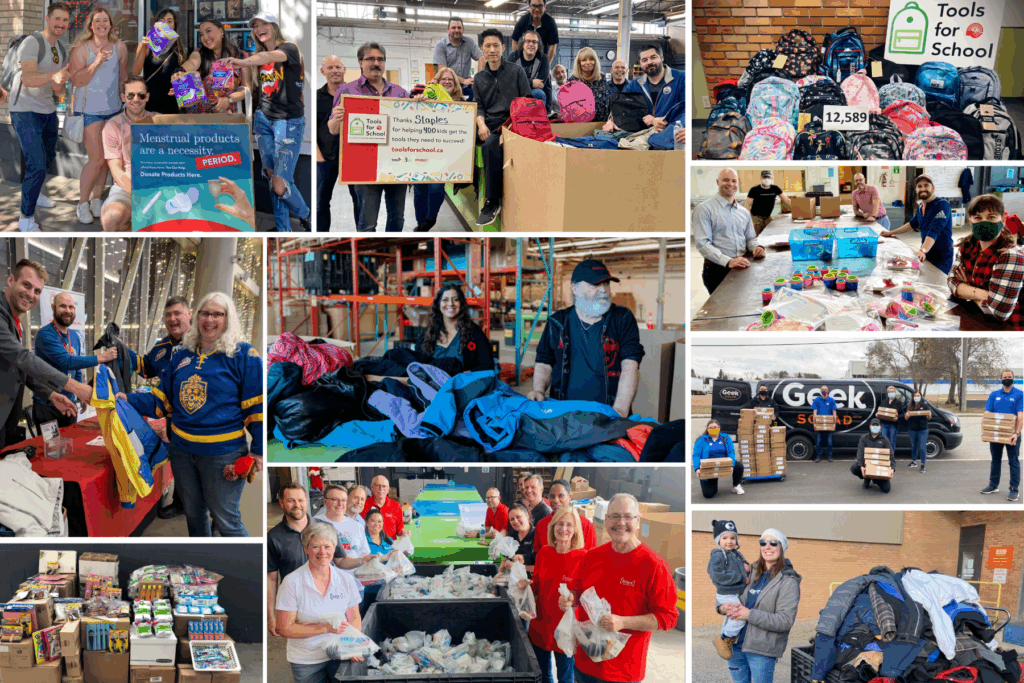
We're announcing some changes at United Way of the Alberta Capital Region. Learn how your impact will continue to make a difference as we evolve to create long-lasting change in our community.